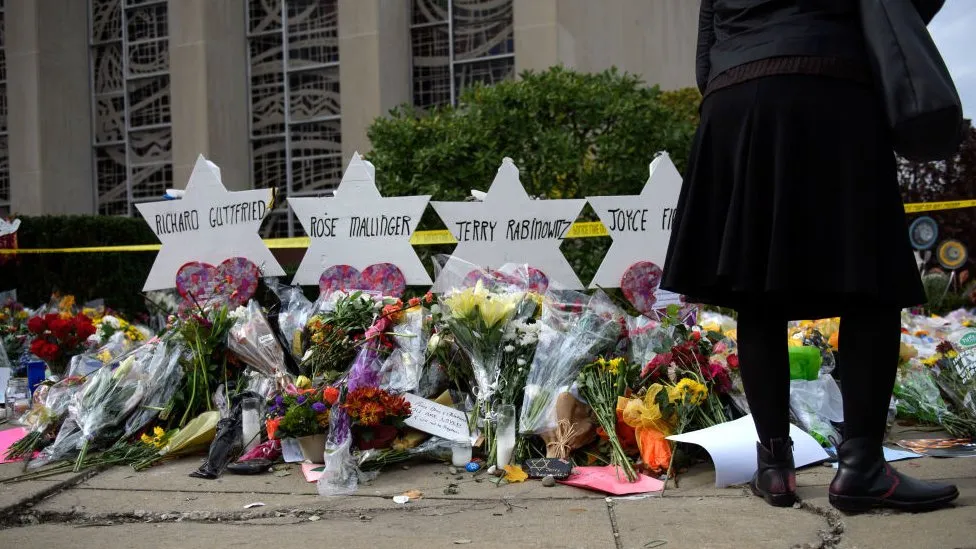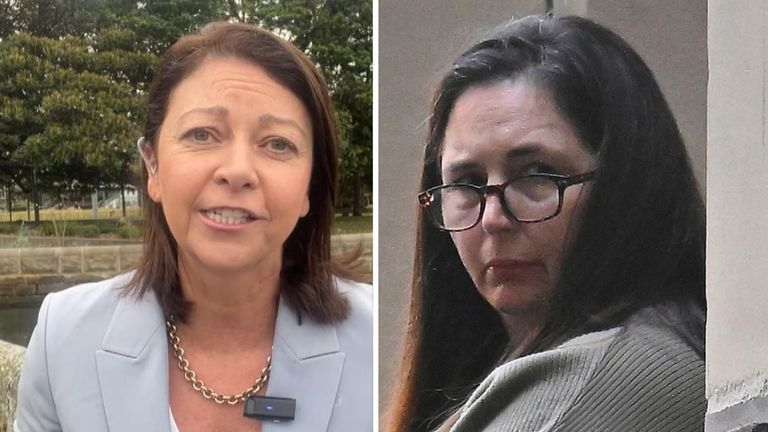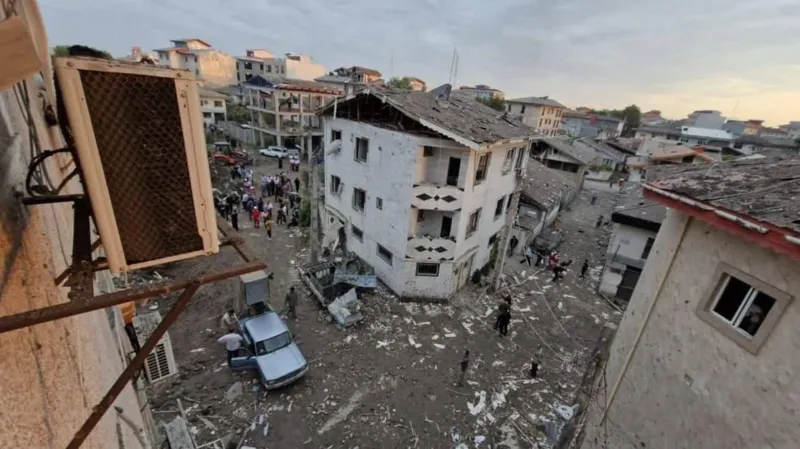After the Tree of Life synagogue shooting, can a community heal?
The trial for the alleged perpetrator of the deadliest antisemitic attack in US history is about to begin. But can the community heal while hate is still on the rise?

At Temple Sinai, in the Squirrel Hill neighbourhood of Pittsburgh, four teenagers are being confirmed into the Jewish faith.
In front of their families, friends and other members of the congregation they talk about what the Ten Commandments mean to their lives. The joyful service is lifted with prayers and singing - all under the watchful gaze of the armed security guard who sits at the entrance to the building.
"Our security budget is ridiculously high," says Rabbi Daniel Fellman from Temple Sinai, who praised the guards for keeping people safe. "It's a sad reality in modern American life that we need to do this."
"I've asked my priest friends what would it feel like for you guys to have armed security at Christmas Eve services or Easter services and they look at me like I have three noses."
But such is the way of life in one of the oldest established Jewish communities in the country, ever since October 2018, when a heavy-set, middle-aged white man entered the nearby Tree of Life synagogue in Pittsburgh and, according to the prosecution, murdered eleven worshipers, injuring two others. The youngest victim was 54, the eldest, Rose Mallinger, was 97.
Reports from survivors say the alleged perpetrator, 50-year-old Robert Bowers, shouted anti-Semitic, hate-filled slogans as he fired an AR-15 assault rifle and three semi-automatic handguns for almost fifteen minutes, working his way from room to room in the building, which was a place of worship for three different congregations.
It was, put simply, the deadliest antisemitic attack in US history.
Over four years on, Mr Bowers is set to appear in court Tuesday for the start of what is expected to be a lengthy and gruelling trial, where he faces 63 charges, including eleven counts of hate crimes resulting in death.
He faces the death penalty, and has pleaded not guilty.
Meanwhile, the Squirrel Hill Jewish community has had to live on edge since the attack, as antisemitic incidents continue to rise across the country.
This new reality is not just confined to Pittsburgh. Figures collated by the Anti-Defamation League (ADL) show that in 2022 there were around 3,700 antisemitic incidents in the United States - the highest number recorded in forty years of collecting such data, says Oren Segal of the ADL.
"This was the deadliest attack against the Jewish community in American history," Mr Segal said. "And yet, here we are about five years later… Jewish communities reaching out to us every day, concerned about whether they should wear their yarmulke or attend their services."
Just a few days before the trial, the White House launched what it described as the first ever national antisemitism strategy, fronted by Doug Emhoff, the husband of the vice-president, who is himself Jewish. It calls for greater awareness, improved safety and security for Jewish communities, and for others to show solidarity with those facing antisemitic activity and discrimination.
It was welcomed by several of the families affected by the Pittsburgh attack.
"Our family has been touched by antisemitism in a very profound way, and if the federal government can create programmes to help reduce this proliferation then we offer support wherever and however we can," said Andrea Wedner, who was badly injured in the attack and whose 97-year-old mother, Rose Mallinger, was killed that day.
Concerns about rising antisemitism had begun before the attack, and had intensified since a violent white-supremacist rally had taken place in Charlottesville, Virginia, just a year before.
Tree of Life Rabbi Jeffrey Myers, who was on duty the day of the shooting, made one of the first emergency calls because he had taken to carrying his mobile phone on the Sabbath as a precaution, even though making phone calls on the holy day is against his religion.
"I am proud that our leaders understand the urgency and importance of countering anti-Semitism in a comprehensive way, but grieve the levels of anti-Semitism in the country that required the need for a plan in the first place," he said in a statement after the White House announcement.
'You never move past it'
Brian Schreiber, president and CEO of the Jewish Community Center of Greater Pittsburgh, said some would be re-traumatised by the trial. Located just five minutes from the scene of the attack, the centre was where the FBI set up its first response, and where the families came to wait for news.
"People thought they'd feel better by now," he said. "What I've learned is that you move with it, you never move past it."
Melvin Wax, Daniel Stein and Richard Gottfried - described by community members as the "backbone of the synagogue" - were praying when they were killed in the attack. Such was their dedication to their faith that their families designed a monument in the shape of a Torah scroll to honour their loved ones. It sits in the New Light congregation's cemetery in a suburb of Pittsburgh.
Inscribed on the monument is 'our holy martyrs'. The phrase was chosen because they died for their faith says Stephen Cohen, co-president of the New Light congregation.
"I think for most of the last 60 years there has been an acceptance and integration of the American Jewish population into America. We are one and the same," he said. "I think what happened in October of 2018 shattered that security."
As the trial begins, the community will have counsellors and religious figures on hand for anyone to talk to, something that's been happening ever since the day of the attack. Much of it organised by the 10.27 Healing Partnership, named to mark the date the Tree of Life, Dor Hadash and New Light congregations were attacked.
Lawyers for Bowers had sought previously to arrange a guilty plea in return for having the death penalty taken off the table, but prosecutors rejected that offer.
The families of those who died take differing perspectives on whether he should be put to death - some are firmly against it, but the majority published an open letter in favour of a capital sentence.
"There are multiple views on the death penalty," says Rabbi Fellman of Temple Sinai. While Jewish teaching does allow for a death penalty, he says some in the community don't believe it should be enacted in this case.
"If there is a set of statutes on the books that carry a capital sentence for these crimes, it's hard to argue that this man wouldn't be a candidate for that," says David Harris, a law professor at Pittsburgh University, who has been helping the families understand how the trial process is likely to unfold.
"This is the most horrific antisemitic act that's ever happened in the United States. It's a mass murderer. There were people who were who were killed who were especially vulnerable, and it was all done in a house of worship."
'This too shall pass'
There is a calm and resigned understanding in Squirrel Hill that nothing can really prepare people for the coming weeks when the events of the day will be revisited and the pain of the loss, once again, laid bare.
"This too shall pass. And the jury will make a decision as to his guilt as to what the appropriate punishment should be," said Mr Cohen, the co-president of the New Light congregation.
The site of the attack is to be rebuilt and will be home to a sanctuary, memorial and centre for fighting antisemitism.
Relatives have been into schools to speak to children about the problem; ecumenical partnerships have been forged, and the Jewish Federation of Greater Pittsburgh has a full-time security consultant in place to advise the community.
"But meanwhile, this [trial] brings back that day and every moment of that day," Mr Cohen said.
-bbc






